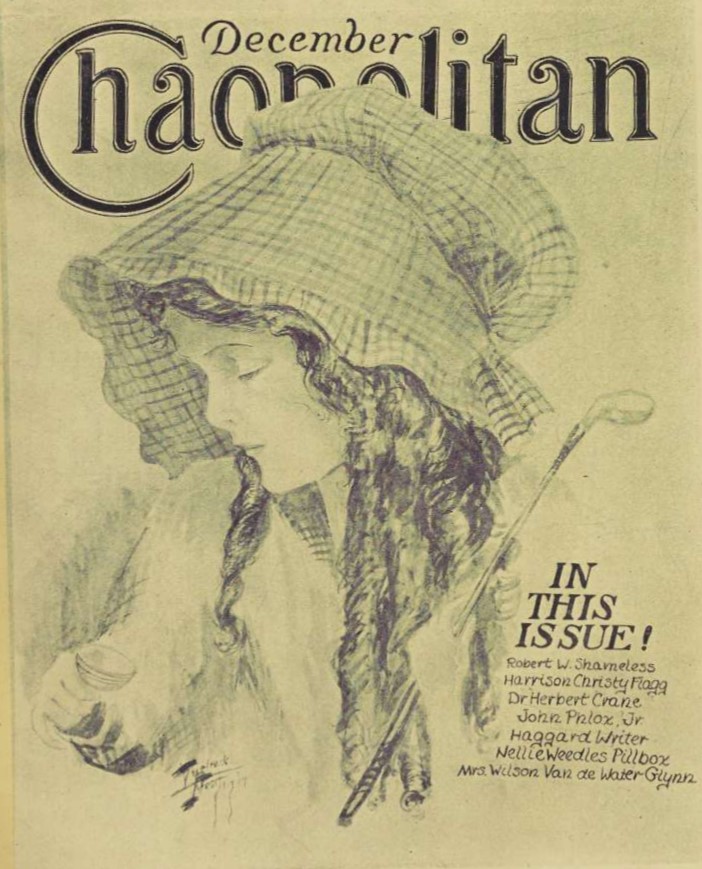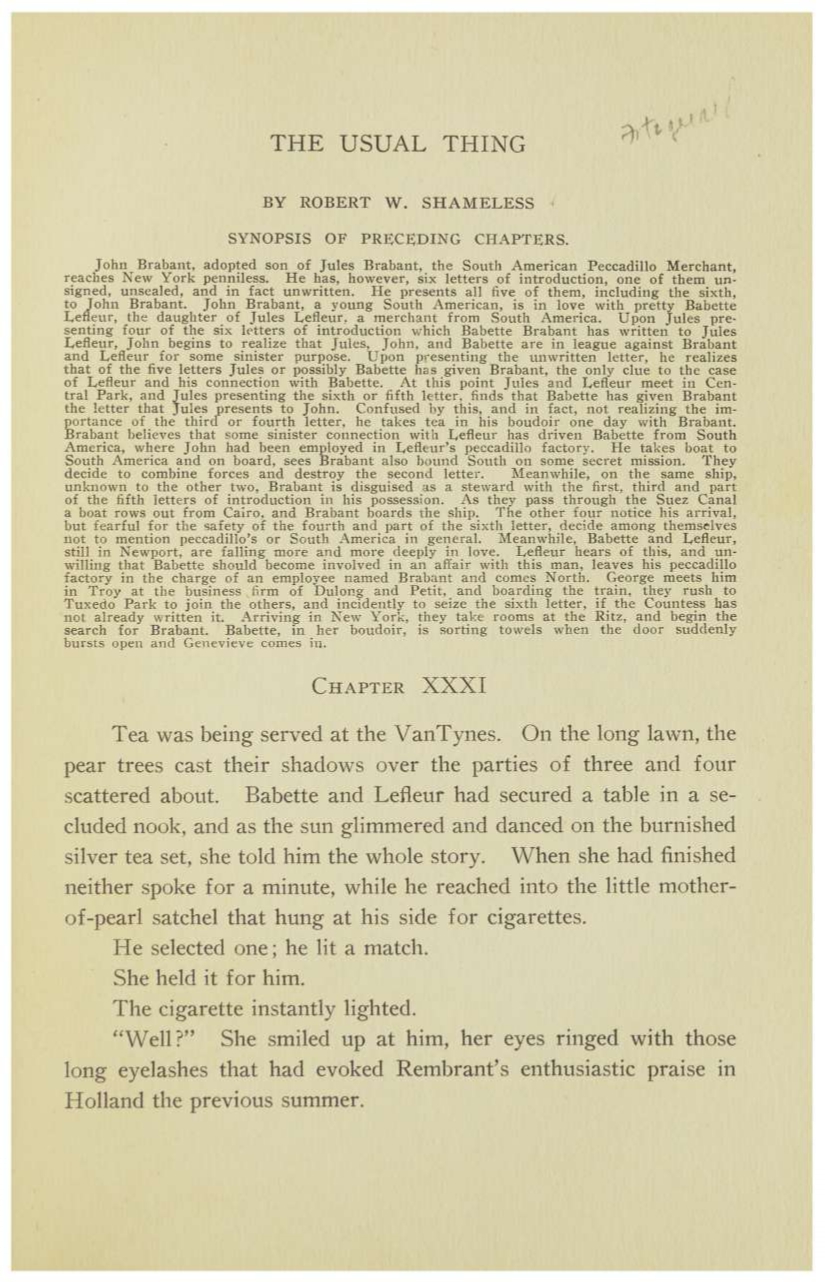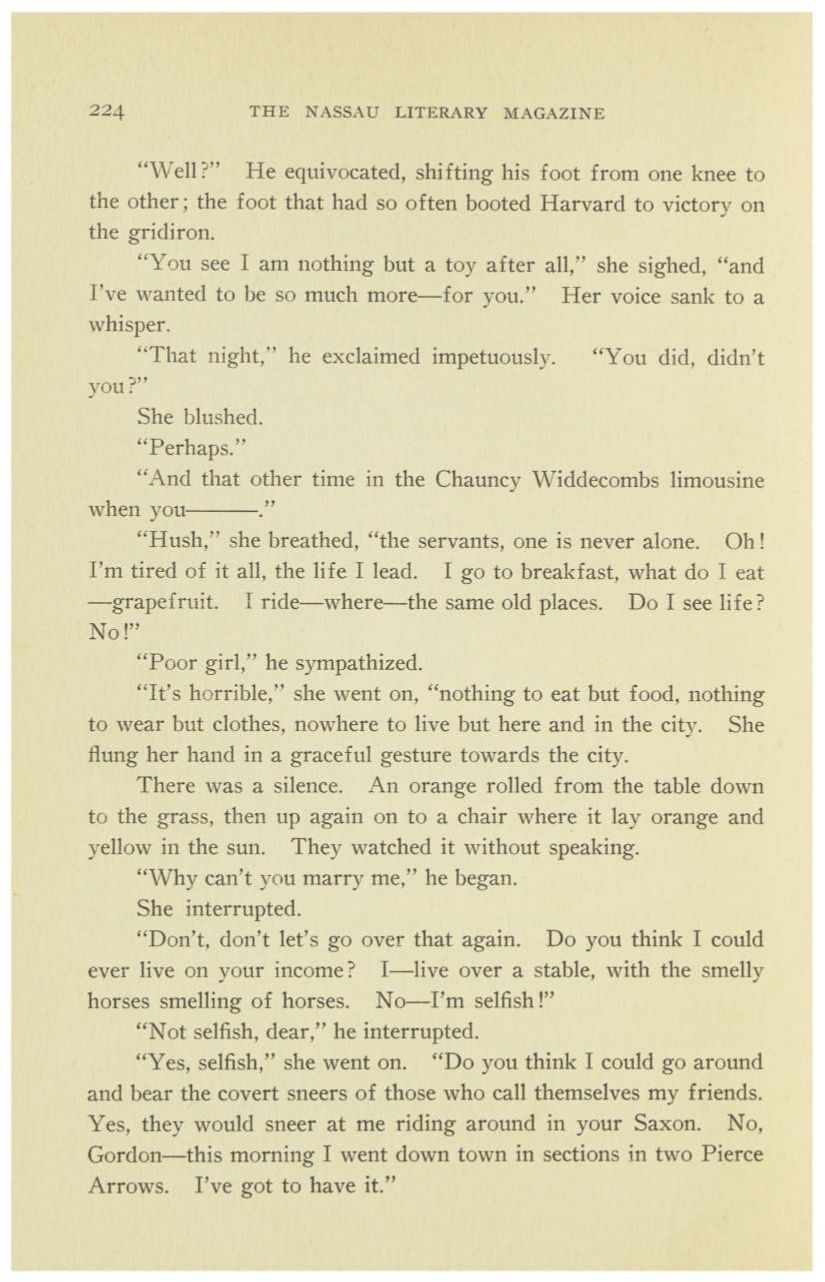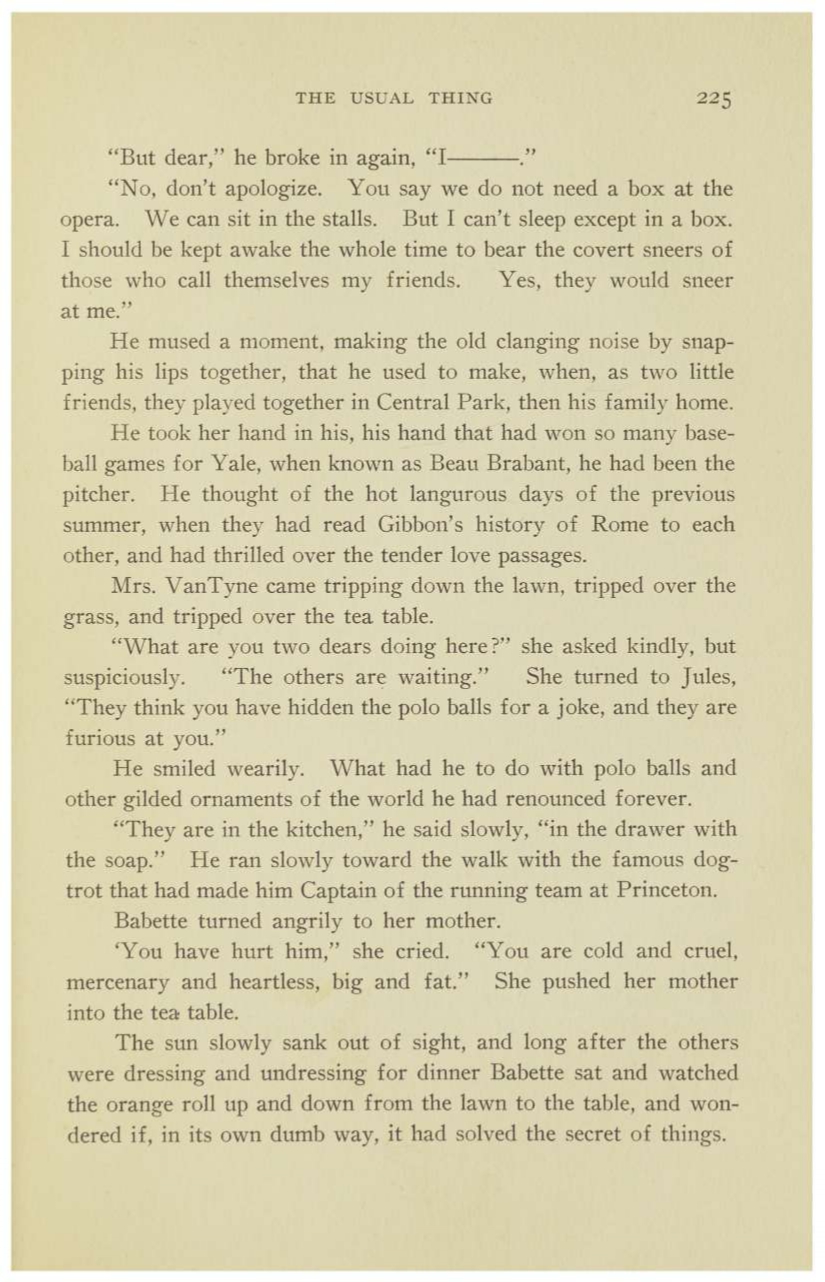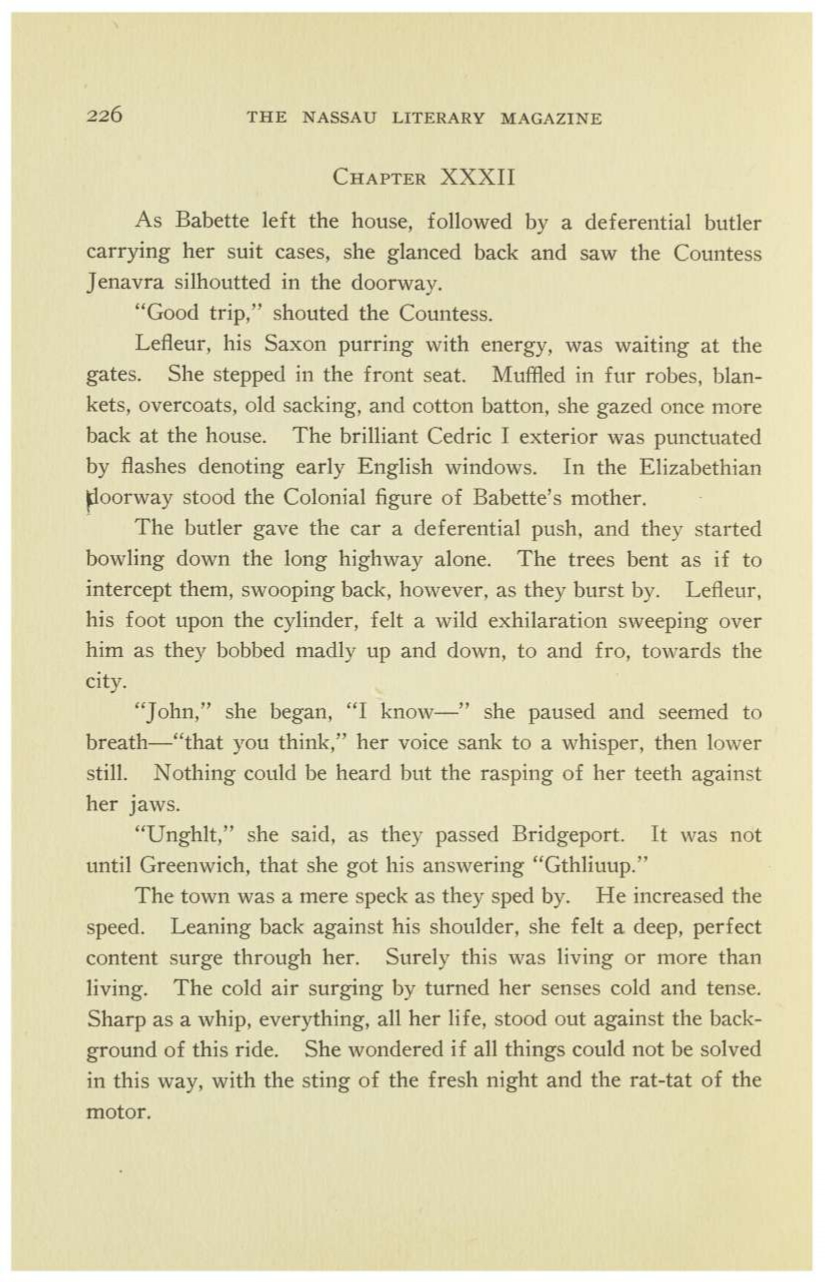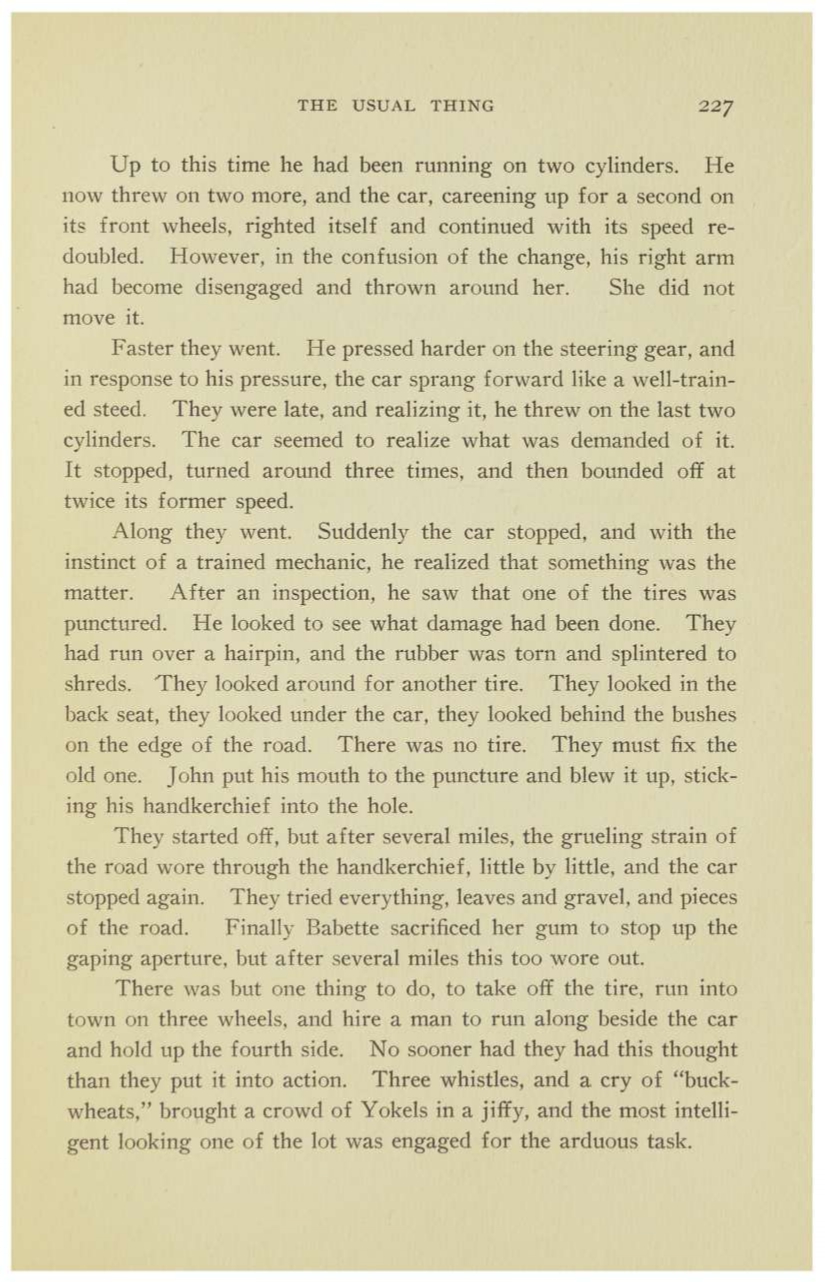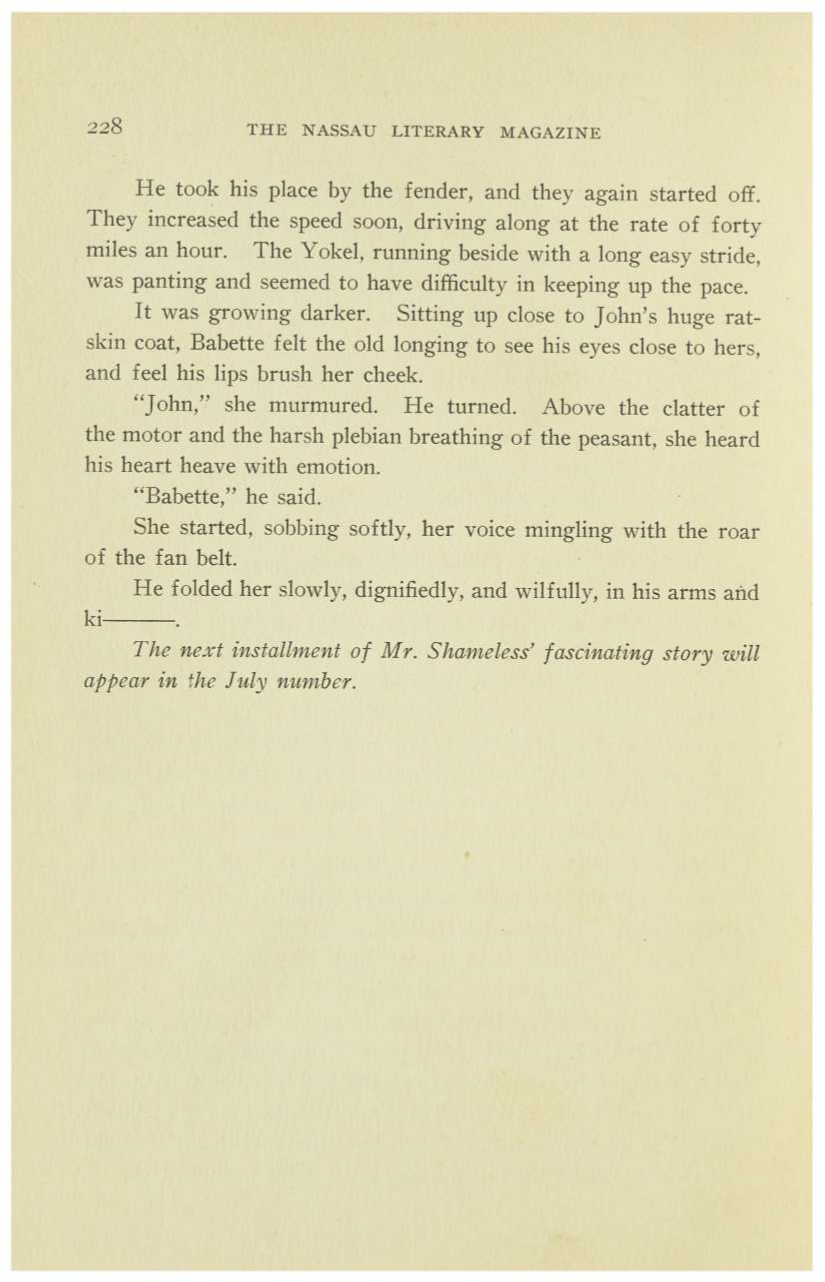
The Usual Thing
by Robert W. Shameless (F. Scott Fitzgerald)
Synopsis of preceding chapters.
John Brabant, adopted son of Jules Brabant, the South American Peccadillo Merchant, reaches New York penniless. He has, however, six letters of introduction, one of them unsigned, unsealed, and in fact unwritten. He presents all five of them, including the sixth, to John Brabant. John Brabant, a young South American, is in love with pretty Babette Lefleur, the daughter of Jules Lefleur, a merchant from South America. Upon Jules presenting four of the six letters of introduction which Babette Brabant has written to Jules Lefleur, John begins to realize that Jules, John, and Babette are in league against Brabant and Lefleur for some sinister purpose. Upon presenting the unwritten letter, he realizes that of the five letters Jules or possibly Babette has given Brabant, the only clue to the case of Lefleur and his connection with Babette. At this point Jules and Fefleur meet in Central Park, and Jules presenting the sixth or fifth letter, finds that Babette has given Brabant the letter than Jules presents to John. Confused by this, and in fact, not realizing the importance of the third or fourth letter, he takes tea in his boudoir one day with Brabant. Brabant believes that some sinister connection with Lefleur has driven Babette from South America, where John had been employed in Lefleur's peccadillo factory. He takes boat to South America and on board, sees Brabant also bound South on some secret mission. They decide to combine forces and destroy the second letter. Meanwhile, on the same ship, unknown to the other two, Brabant is disguised as a steward with the first, third and part of the fifth letters of introduction in his possession. As they pass through the Suez Canal a boat rows out from Cairo, and Brabant boards the ship. The other four notice his arrival, but fearful for the safety of the fourth and part of the sixth letter, decide among themselves not to mention peccadillo's or South America in general. Meanwhile, Babette and Lefleur, still in Newport, are falling more and more deeply in love. Lefleur hears of this, and unwilling that Babette should become involved in an affair with this man, leaves his peccadillo factory in the charge of an employee named Brabant and comes North. George meets him in Troy at the business firm of Dulong and Petit, and boarding the train, they rush to Tuxedo Park to join the others, and incidently to seize the sixth letter, if the Countess has not already written it. Arriving in New York, they take rooms at the Ritz, and begin the scach for Brabant. Babette, in her boudoir, is sorting towels when the door suddenly bursts open and Genevieve comes in.
Chapter XXXI
Tea was being served at the VanTynes. On the long lawn, the pear trees cast their shadows over the parties of three and four scattered about. Babette and Lefleur had secured a table in a secluded nook, and as the sun glimmered and danced on the burnished silver tea set, she told him the whole story. When she had finished neither spoke for a minute, while he reached into the little mother-of-pearl satchel that hung at his side for cigarettes.
He selected one; he lit a match.
She held it for him.
The cigarette instantly lighted.
“Well?” She smiled up at him, her eyes ringed with those long eyelashes that had evoked Rembrant's enthusiastic praise in Holland the previous summer.
“Well?” He equivocated, shifting his foot from one knee to the other; the foot that had so often booted Harvard to victory on the gridiron.
“You see I am nothing but a toy after all,” she sighed, “and I've wanted to be so much more—for you.” Her voice sank to a whisper.
“That night,” he exclaimed impetuously. “You did, didn't you?” She blushed.
“Perhaps.”
“And that other time in the Chauncy Widdecombs limousine when you———”
“Hush, she breathed, “the servants, one is never alone. Oh! I'm tired of it all, the life I lead. I go to breakfast, what do I eat—grapefruit. I ride—where—the same old places. Do I see life? No!”
“Poor girl,” he sympathized.
“It's horrible,” she went on, “nothing to eat but food, nothing to wear but clothes, nowhere to live but here and in the city. She flung her hand in a graceful gesture towards the city.
There was a silence. An orange rolled from the table down to the grass, then up again on to a chair where it lay orange and yellow in the sun. They watched it without speaking.
“Why can't you marry me,” he began.
She interrupted.
“Don't, don't let's go over that again. Do you think I could everlive on your income? I—live over a stable, with the smelly horses smelling of horses. No—I'm selfish!”
“Not selfish, dear,” he interrupted.
“Yes, selfish,” she went on. “Do you think I could go around and bear the covert sneers of those who call themselves my friends. Yes, they would sneer at me riding around in your Saxon. No, Gordon— this morning I went down town in sections in two Pierce Arrows. I've got to have it.”
“But dear,” he broke in again, “I———”
“No, don't apologize. You say we do not need a box at the opera. We can sit in the stalls. But I can't sleep except in a box. I should be kept awake the whole time to bear the covert sneers of those who call themselves my friends. Yes, they would sneer at me.”
He mused a moment, making the old clanging noise by snapping his lips together, that he used to make, when, as two little friends, they played together in Central Park, then his family home.
He took her hand in his, his hand that had won so many baseball games for Yale, when known as Beau Brabant, he had been the pitcher. He thought of the hot langurous days of the previous summer, when they had read Gibbon's history of Rome to each other, and had thrilled over the tender love passages.
Mrs. VanTyne came tripping down the lawn, tripped over the grass, and tripped over the tea table.
“What are you two dears doing here?” she asked kindly, but suspiciously. “The others are waiting.” She turned to Jules, “They think you have hidden the polo balls for a joke, and they are furious at you.”
He smiled wearily. What had he to do with polo balls and other gilded ornaments of the world he had renounced forever.
“They are in the kitchen,” he said slowly, “in the drawer with the soap.” He ran slowly toward the walk with the famous dogtrot that had made him Captain of the running team at Princeton.
Babette turned angrily to her mother.
“You have hurt him,” she cried. “You are cold and cruel, mercenary and heartless, big and fat.” She pushed her mother into the tea table.
The sun slowly sank out of sight, and long after the others were dressing and undressing for dinner Babette sat and watched the orange roll up and down from the lawn to the table, and wondered if, in its own dumb way, it had solved the secret of things.
Chapter XXXII
As Babette left the house, followed by a deferential butler carrying her suit cases, she glanced back and saw the Countess Jenavra silhoutted in the doorway.
“Good trip,” shouted the Countess.
Lefleur, his Saxon purring with energy, was waiting at the gates. She stepped in the front seat. Muffled in fur robes, blankets, overcoats, old sacking, and cotton batton, she gazed once more back at the house. The brilliant Cedric I exterior was punctuated by flashes denoting early English windows. In the Elizabethian doorway stood the Colonial figure of Babette's mother.
The butler gave the car a deferential push, and they started bowling down the long highway alone. The trees bent as if to intercept them, swooping back, however, as they burst by. Lefleur, his foot upon the cylinder, felt a wild exhilaration sweeping over him as they bobbed madly up and down, to and fro, towards the city.
“John,” she began, “I know—” she paused and seemed to breath— “that you think,” her voice sank to a whisper, then lower still. Nothing could be heard but the rasping of her teeth against her jaws.
“Unghlt,” she said, as they passed Bridgeport. It was not until Greenwich, that she got his answering “Gthliuup.”
The town was a mere speck as they sped by. He increased the speed. Leaning back against his shoulder, she felt a deep, perfect content surge through her. Surely this was living or more than living. The cold air surging by turned her senses cold and tense. Sharp as a whip, everything, all her life, stood out against the background of this ride. She wondered if all things could not be solved in this way, with the sting of the fresh night and the rat-tat of the motor.
Up to this time he had been running on two cylinders. He now threw on two more, and the car, careening up for a second on its front wheels, righted itself and continued with its speed redoubled. However, in the confusion of the change, his right arm had become disengaged and thrown around her. She did not move it.
Faster they went. He pressed harder on the steering gear, and in response to his pressure, the car sprang forward like a well-trained steed. They were late, and realizing it, he threw on the last two cylinders.The car seemed to realize what was demanded of it. It stopped, turned around three times, and then bounded off at twice its former speed.
Along they went. Suddenly the car stopped, and with the instinct of a trained mechanic, he realized that something was the matter. After an inspection, he saw that one of the tires was punctured. He looked to see what damage had been done. They had run over a hairpin, and the rubber was torn and splintered to shreds. They looked around for another tire. They looked in the back seat, they looked under the car, they looked behind the bushes on the edge of the road. There was no tire. They must fix the old one. John put his mouth to the puncture and blew it up, sticking his handkerchief into the hole.
They started off, but after several miles, the grueling strain of the road wore through the handkerchief, little by little, and the car stopped again. They tried everything, leaves and gravel, and pieces of the road. Finally Babette sacrificed her gum to stop up the gaping aperture, but after several miles this too wore out.
There was but one thing to do, to take off the tire, run into town on three wheels, and hire a man to run along beside the car and hold up the fourth side. No sooner had they had this thought than they put it into action. Three whistles, and a cry of “buckwheats,” brought a crowd of Yokels in a jiffy, and the most intelligent looking one of the lot was engaged for the arduous task.
He took his place by the fender, and they again started off. They increased the speed soon, driving along at the rate of forty miles an hour. The Yokel, running beside with a long easy stride, was panting and seemed to have difficulty in keeping up the pace.
It was growing darker. Sitting up close to John's huge ratskin coat, Babette felt the old longing to see his eyes close to hers, and feel his lips brush her cheek.
“John,” she murmured. He turned. Above the clatter of the motor and the harsh plebian breathing of the peasant, she heard his heart heave with emotion.
“Babette,” he said.
She started, sobbing softly, her voice mingling with the roar of the fan belt.
He folded her slowly, dignifiedly, and wilfully, in his arms and ki——
The next installment of Mr. Shameless' fascinating story will appear in the July number.
Published in The Nassau Literary Magazine magazine (Chaopolitan issue - December 1916); NB. in this issue was also published Jemina, the Mountain Girl (later included in Tales of the Jazz Age collection), and Our Next Issue; click on the magazine sleeve to see whole Chaopolitan issue magazine.
Not illustrated.
